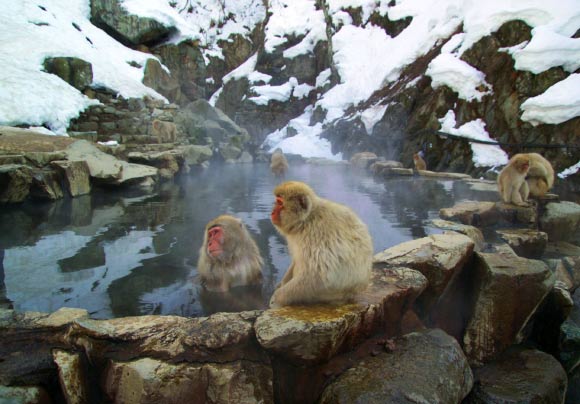Japanese macaques (Macaca fuscata), also known as snow monkeys, are the world’s most northerly species of non-human primates. They have been enjoying regular baths in the hot spring at Jigokudani in Japan for decades. Kyoto University researcher Rafaela Takeshita and co-authors have now published the first study to validate the benefits of this behavior.
In 1977, a research team led by Kumamoto University scientist Tetsuro Hori reported that during winter, Japanese macaques living in Jigokudani Monkey Park in Nagano have the unusual habit of bathing in a hot spring pool.
This behavior was first observed in 1963, when a juvenile female was observed bathing in an outdoor hot spring belonging to a nearby hotel on a snowy day.
Other juveniles and adults did likewise, until the end of March, when they ceased entering the hot spring. They were next observed bathing the following winter.
For hygienic purposes, the park management decided to build a hot spring only for the monkeys, and by 2003, one in every three females in the group bathed regularly in winter.
Although the fact that snow monkeys bathe more often during winter suggests that they use the hot spring to stay warm, to date no physiological data had been collected to support this idea.
Dr. Takeshita and her colleagues studied 12 adult females during the spring birth season, from April to June, and winter mating season, from October to December.
The researchers determined how much time the monkeys spent in the hot springs, and which monkeys bathed the most.
They also collected fecal samples during times of extreme cold and analyzed the concentration of fecal glucocorticoid metabolite present. This was done because thermoregulatory stress and the management of a body temperature is known to influence concentrations of glucocorticoids, which belong to the family of steroid hormones.
The team’s results, published in the journal Primates, confirmed that female Japanese macaques use the hot spring more often in winter than in spring, and especially during colder weeks.
Dominant females benefited from their status and spent longer time bathing, but they were also involved in more aggressive conflicts, resulting in higher energy expenditure than subordinate females.
But taking a spa reduced stress hormone levels in those females.
So high social status in this group of Japanese macaques has a trade-off between the costs of high rank position and the benefits from a hot spring, which is advantageous for conserving energy by reducing loss of body heat, and lowering stress levels.
“This indicates that, as in humans, the hot spring has a stress-reducing effect in snow monkeys,” Dr. Takeshita said.
“Further investigation using serum or saliva samples might be useful to detect whether there are any further short-term changes in stress levels.”
“This unique habit of hot spring bathing by snow monkeys illustrates how behavioral flexibility can help counter cold-climate stress, with likely implications for reproduction and survival.”
In addition, the team found that the around 500 visitors per day, who watch the snow monkeys bathe, had no effect on the levels of stress hormones released.
_____
Rafaela S.C. Takeshita et al. Beneficial effect of hot spring bathing on stress levels in Japanese macaques. Primates, published online April 3, 2018; doi: 10.1007/s10329-018-0655-x








